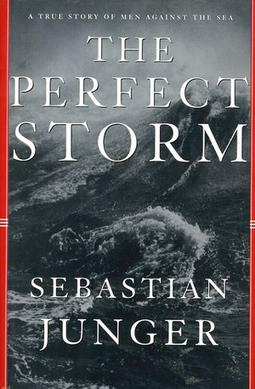Sebastian Junger gave
himself an impossible task in writing "The Perfect Storm": To
describe the disappearance of six men and their fishing boat at sea, even though there were no survivors and no witnesses, and neither the boat nor
the men were ever found.
In many ways, it's
remarkable how close Junger comes to portraying the unknowable. He pulls the
reader intimately into the world of commercial fishing, describing the men of
the Andrea Gail, their lives and loves, and their roles on a fishing boat. He
carefully details the functions of the boats and the hazards of this type of
fishing. He describes how this storm created
huge waves (actually, he goes on too long on the size of the waves) and what could
have caused the boat to flood, sink or capsize. He gives a gruesomely detailed description of
drowning.
It's an engaging story,
but ultimately Junger just can't tell us what actually happened, and that
leaves an unsatisfying aftertaste for the reader. In the latter parts of the
book, as if he suddenly became aware of this weakness, Junger adds in some
other tales of people in trouble during the same storm. In one case, three
people are rescued off a sailboat. In another, a rescue helicopter crashes into
the ocean and the crew needs to be rescued.
These are exciting tales in and of themselves, but they seem clumsily
tacked on to the story of the Andrea Gail.
It's as if Junger says, "Hey, I can't tell you what happened to the
Andrea Gail. But look at these great stories of danger and survival."
A better approach
would have been for Junger to tell all these stories in parallel,
showing these different people and lives from the start, and then linking them
through their fight to survive the "perfect storm."
I'm probably being
kind of hard on this book because it's been praised so highly. In fairness, Junger does provide a terrific
look at commercial fishing, a world that few of us are familiar with.
This is a "guy" book (this is just a characterization
of the book; many women may enjoy guy books). Not only is there the inherent danger and
adventure, but there are many technical descriptions of the workings of boats,
rescue helicopters and weather equipment.
I'm not a boater
myself, and often these sort of books get bogged down in boating jargon. I give Junger
half-credit on this. In some cases, he ably describes the boat operations for
the average reader. Other times, however, he tosses in boating phrases without
definition, leaving the non-boater to guess at his meaning.
---
(Please support this blog by clicking on the ads)

No comments:
Post a Comment